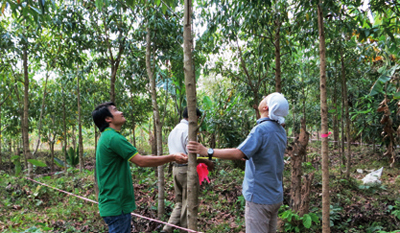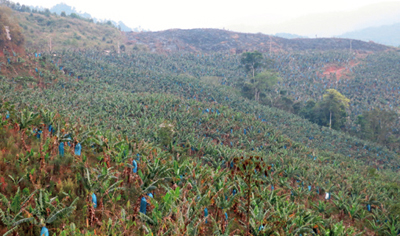Project Leader:YOKOYAMA, Satoshi (Graduate School of Environmental Studies, Nagoya University)
Collaborators:KONO, Yasuyuki (Center for Southeast Asian Studies, Kyoto University)
TOMITA, Shinsuke (Center for Southeast Asian Studies, Kyoto University)
TOJYOU, Bumpei (Research Department, Research Institute for Humanity and Nature)
MANIEMAI, Thongyou (Center for Research on Plurality in the Mekong Region,
Khon Kaen University)
Term:2012-2013
Outline of Research:
The purpose of the study is to clarify the various relationships that lie behind land-use changes which are rapidly expanding the areas of agro-forest products and plantation trees, a phenomenon caused by recent globalization in the Mekong region, particularly in Thailand, Laos and Cambodia. In order to figure out those driving forces of land-use changes and resource chains in the study area, sugarcane and para-rubber trees will be taken as intended agro-forest products.
Purpose of Study

Measuring forest canopy in Tabunoki (Machilus spp.) plantation site in southern Laos. Plantation area of Tabunoki, used as incense glue, has rapidly increased in Laos. All bark harvested was sold to neighboring countries, and after that some of them are sold to Japan.
In the Mekong region, rapid land-use changes have occurred through the introduction of various agro-forest products. These cope with demands from external market. However, we do not know how land-use changes impact on locals’ livelihood, regional society and the natural ecosystem in the Mekong region. Therefore, this study
will focus attention on changes in land-use and resource chains of agro-forest products through globalization in three countries, Thailand, Laos and Cambodia. It will clarify the various relationships that lie behind land-use changes.
Significance of the Study:
When countries, communities and individuals in the Mekong region were confronted with something new, how did they handle it and through what criteria? They might have developed subsistence strategies particular to social and natural environments in Mekong regions in their long history. And in particular, they did not always yield to Western control, U.S. and Japanese invasion and Chinese hegemony. In this study, we aim to understand the proximate causes, remote causes, as well as driving forces of changes in landuse and resource chains by newly introduced agro-forest products in the Mekong region. The originality and significant of this study is to conduct a way of sustainable land use from the viewpoint of locals.
Expected Results
The following two outcomes will be expected:
1. The prediction of both socio-economic and ecological changes in the study area by clarifying resource chains that the various relationships that lie behind land-use changes brought about by globalization.
2. The creation of socio-economic, ecological and political guidelines for the management of resources (control of production, distribution and consumption) by clarifying the changes in land-use and regional society after introducing new agro-forest products resource into the Mekong region.
This study will provide a path to appropriate resource use and management so that locals can properly manage and sustainably use the resources for themselves.

